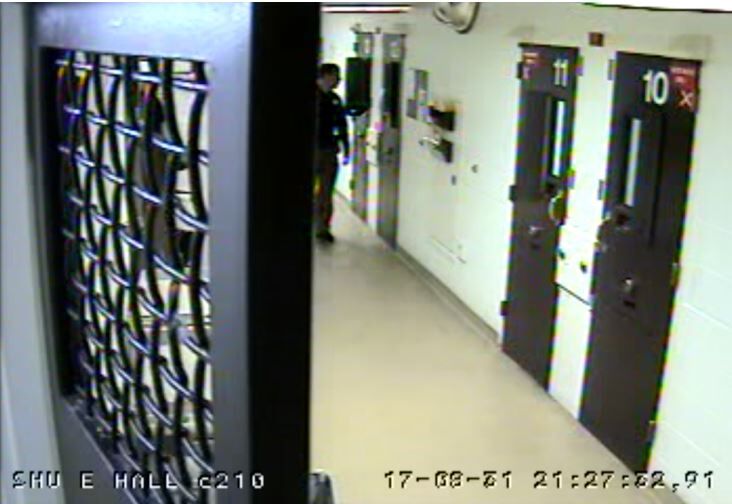10th Circuit decides 2-1 that Jeffco sheriff, deputies may not be held liable for detainee’s suicide

The federal appeals court based in Denver has decided by 2-1 that the Jefferson County sheriff and two of his deputies cannot be held liable for failing to take steps to prevent the suicide of an at-risk detainee in the county jail.
Even though Susanne Burgaz was allegedly “red-flagged” as a suicide risk, was left alone with implements to harm herself, and was actively fashioning a noose when a deputy walked by without looking into her room, the U.S. Court of Appeals for the 10th Circuit found that jail staff had no clear knowledge of Burgaz’s suicidality.
“(I)t is not obvious a distressed, physically frail detainee who should have been surveilled constantly would have committed suicide in the dayroom when left alone for twenty minutes,” wrote Chief Judge Timothy M. Tymkovich for the majority on the three-judge panel that heard the case.
The decision upheld a lower court’s ruling that Deputies Petrina Pesapane and Joseph Scalise were entitled to qualified immunity for their actions. Tymkovich reasoned that Pesapane had left Burgaz alone under the assumption that Scalise would monitor her, but Scalise’s failure to do so was also not grounds for a constitutional lawsuit.
Because the plaintiffs, who were the adult children of Burgaz, had not plausibly alleged the deputies had violated their mother’s constitutional rights, Sheriff Jeff Shrader could not be held responsible for failing to train or supervise them.
The federal lawsuit described how Burgaz entered the Jefferson County jail on Aug. 30, 2017 for “low-level” offenses. An electronic system known as Tiburon indicated a red flag on Burgaz from a previous stay in the jail, during which she was placed on suicide watch.
Jail staff assigned her to the special housing unit, or SHU, which is reportedly intended for suicidal detainees and those with medical needs. The following day, a judge ordered Burgaz released and she stayed in the SHU’s dayroom while waiting to leave.
However, at 9 p.m., Pesapane told Burgaz she would not be released after all due to warrants in other jurisdictions. Burgaz was reportedly “distraught” and “despondent.” Pesapane left Burgaz alone in the dayroom for approximately 10 minutes, after which Burgaz banged on the door. No one responded.
Shortly afterward, Burgaz began multiple attempts to hang herself using a cable attached to the dayroom’s television. Scalise allegedly conducted a walk-through at the same time and passed by the dayroom at the moment Burgaz was about to begin her third and final suicide attempt. Security footage indicated Scalise did not look through the viewing panel into the dayroom.
At 10 p.m., 30 minutes after Burgaz hanged herself, jail staff found her, despite there being more than a dozen live surveillance feeds in the SHU.
Burgaz’s children and estate sued Pesapane, Scalise and Shrader in 2019, claiming the deputies exhibited deliberate indifference to their mother’s serious medical needs.
“The end result, while tragic, was also predictable,” attorney Zachary D. Warren wrote to the 10th Circuit. “With ready access to television cables and electrical cords and a complete lack of supervision, in gross violation of the very policies designed to prevent inmates from engaging in self-harm, Susanne had the time and means to make three separate suicide attempts.”
Last January, U.S. Magistrate Judge S. Kato Crews dismissed the lawsuit, believing the allegations could not plausibly label the deputies’ actions as deliberate indifference. Legally, plaintiffs must show not only that there was a serious risk to a detainee, but that jail staff knew of and disregarded that risk.
Crews found the allegations “so general” that he could not say Pesapane or Scalise appeared to know of a specific risk to Burgaz. He granted qualified immunity to the deputies, which shields government employees from civil liability unless they violate a person’s clearly-established legal right. Because the deputies had not violated Burgaz’s rights, Shrader could not be held liable either.
On appeal, Warren argued that several pieces of information, from the red flag in the Tiburon system to Pesapane’s face-to-face interaction with Burgaz, should have alerted the deputies to the potential for danger.
“In this particular case, when you’re in the SHU with a known acute risk and then you fail to observe the person while they’re objectively in the most dangerous area of the SHU, you have made the connection that there is an imminent risk of serious bodily injury or harm, and you failed to take reasonable measures,” he told the judges during oral arguments.
Rebecca P. Klymkowsky, assistant county attorney for Jeffco, agreed that “this is a tragic case, but not every tragedy is actionable.”
In an unusual move, all three judges on the 10th Circuit panel authored separate opinions. Tymkovich’s majority opinion concluded that the deputies, on the night of Burgaz’s suicide, only knew her to generally be mentally ill and with suicidal tendencies. Pesapane, from her interaction with Burgaz, also allegedly knew Burgaz was despondent and in a room with materials Burgaz could use to harm herself.
Tymkovich wrote that Pesapane could not have believed Burgaz would die by suicide because there were deputies conducting periodic walk-throughs of the SHU. At the same time, Scalise, who actually conducted the walk-through, could not be liable because “failing to take the few extra seconds to look in the dayroom” was not deliberate indifference, Tymkovich decided.
Judge Harris L Hartz, who joined Tymkovich in the majority, emphasized that Pesapane, as the last person who interacted with Burgaz before her death, need not have taken additional actions based on what she knew, such as removing the dayroom’s television cords or staying with Burgaz out of an abundance of caution.
“What more might Deputy Pesapane have done?” Hartz asked. “I do not foreclose the possibility that a jury could properly find Deputy Pesapane negligent in not removing all cords and cables from the television in the dayroom. But it is commonplace for this court to hold that evidence sufficient to support a claim of negligence fails to support a claim of deliberate indifference.”
Judge Scott M. Matheson Jr. agreed that Scalise had not committed a plausible constitutional violation, but believed Pesapane had. The 10th Circuit, he wrote, has never said that a risk of suicide is obvious only if a detainee states they are suicidal or is currently on suicide watch. The facts that Pesepane allegedly learned about Burgaz suggested she knew of a serious risk of suicide.
“Unlike other medical emergencies where a prison guard might not know what to do, calling for help and/or staying with a suicidal detainee and observing her until other measures could be taken would be straightforward, ‘reasonable measures to abate’ the risk,” Matheson wrote.
Because he found the plaintiffs had plausibly alleged a constitutional violation, Matheson would have also reinstated the claim against Shrader.
After Crews originally dismissed the lawsuit, the plaintiffs filed another complaint in Jefferson County against Shrader only, alleging negligence resulting in death. District Court Judge Lily Oeffler dismissed that case in September, saying the statute of limitations had expired. The state’s Court of Appeals is now reviewing her decision.
In February of this year, another woman died in the county’s jail, resulting in two deputies being placed on unpaid leave.
The case is Estate of Susanne Burgaz et al. v. Board of County Commissioners et al.














